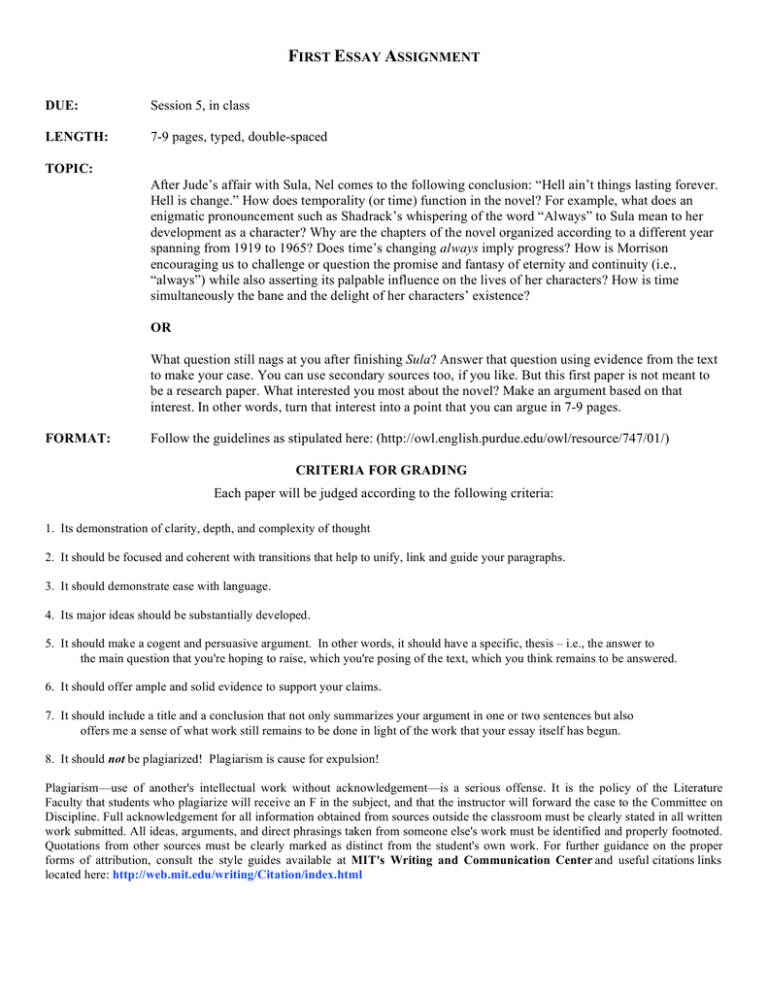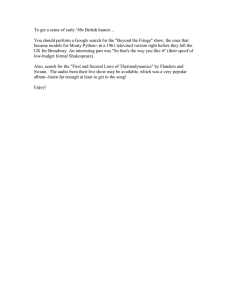F E A
advertisement

FIRST ESSAY ASSIGNMENT DUE: Session 5, in class LENGTH: 7-9 pages, typed, double-spaced TOPIC: After Jude’s affair with Sula, Nel comes to the following conclusion: “Hell ain’t things lasting forever. Hell is change.” How does temporality (or time) function in the novel? For example, what does an enigmatic pronouncement such as Shadrack’s whispering of the word “Always” to Sula mean to her development as a character? Why are the chapters of the novel organized according to a different year spanning from 1919 to 1965? Does time’s changing always imply progress? How is Morrison encouraging us to challenge or question the promise and fantasy of eternity and continuity (i.e., “always”) while also asserting its palpable influence on the lives of her characters? How is time simultaneously the bane and the delight of her characters’ existence? OR What question still nags at you after finishing Sula? Answer that question using evidence from the text to make your case. You can use secondary sources too, if you like. But this first paper is not meant to be a research paper. What interested you most about the novel? Make an argument based on that interest. In other words, turn that interest into a point that you can argue in 7-9 pages. FORMAT: Follow the guidelines as stipulated here: (http://owl.english.purdue.edu/owl/resource/747/01/) CRITERIA FOR GRADING Each paper will be judged according to the following criteria: 1. Its demonstration of clarity, depth, and complexity of thought 2. It should be focused and coherent with transitions that help to unify, link and guide your paragraphs. 3. It should demonstrate ease with language. 4. Its major ideas should be substantially developed. 5. It should make a cogent and persuasive argument. In other words, it should have a specific, thesis – i.e., the answer to the main question that you're hoping to raise, which you're posing of the text, which you think remains to be answered. 6. It should offer ample and solid evidence to support your claims. 7. It should include a title and a conclusion that not only summarizes your argument in one or two sentences but also offers me a sense of what work still remains to be done in light of the work that your essay itself has begun. 8. It should not be plagiarized! Plagiarism is cause for expulsion! Plagiarism—use of another's intellectual work without acknowledgement—is a serious offense. It is the policy of the Literature Faculty that students who plagiarize will receive an F in the subject, and that the instructor will forward the case to the Committee on Discipline. Full acknowledgement for all information obtained from sources outside the classroom must be clearly stated in all written work submitted. All ideas, arguments, and direct phrasings taken from someone else's work must be identified and properly footnoted. Quotations from other sources must be clearly marked as distinct from the student's own work. For further guidance on the proper forms of attribution, consult the style guides available at MIT's Writing and Communication Center and useful citations links located here: http://web.mit.edu/writing/Citation/index.html MIT OpenCourseWare http://ocw.mit.edu 21M.630J / 21A.114J / 21H.106J / 21L.008J / 21W.741J / 24.912J Black Matters: Introduction to Black Studies Fall 2009 For information about citing these materials or our Terms of Use, visit: http://ocw.mit.edu/terms.





